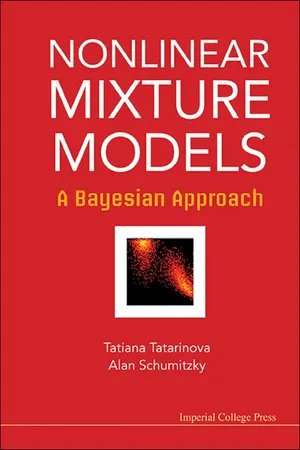
Nonlinear Mixture Models: A Bayesian Approach
A Bayesian Approach
- 296 pages
- English
- ePUB (mobile friendly)
- Available on iOS & Android
About this book
This book, written by two mathematicians from the University of Southern California, provides a broad introduction to the important subject of nonlinear mixture models from a Bayesian perspective. It contains background material, a brief description of Markov chain theory, as well as novel algorithms and their applications. It is self-contained and unified in presentation, which makes it ideal for use as an advanced textbook by graduate students and as a reference for independent researchers. The explanations in the book are detailed enough to capture the interest of the curious reader, and complete enough to provide the necessary background material needed to go further into the subject and explore the research literature.
In this book the authors present Bayesian methods of analysis for nonlinear, hierarchical mixture models, with a finite, but possibly unknown, number of components. These methods are then applied to various problems including population pharmacokinetics and gene expression analysis. In population pharmacokinetics, the nonlinear mixture model, based on previous clinical data, becomes the prior distribution for individual therapy. For gene expression data, one application included in the book is to determine which genes should be associated with the same component of the mixture (also known as a clustering problem). The book also contains examples of computer programs written in BUGS. This is the first book of its kind to cover many of the topics in this field.
Contents:
- Introduction
- Mathematical Description of Nonlinear Mixture Models
- Label Switching and Trapping
- Treatment of Mixture Models with an Unknown Number of Components
- Applications of BDMCMC, KLMCMC, and RPS
- Nonparametric Methods
- Bayesian Clustering Methods
Readership: Graduate students and researchers in bioinformatics, mathematical biology, probability and statistics, mathematical modeling, and pharmacokinetics.
Tools to learn more effectively

Saving Books

Keyword Search

Annotating Text

Listen to it instead
Information
Table of contents
- Cover Page
- Title Page
- Copyright Page
- List of Tables
- List of Figures
- Acknowledgments
- 1. Introduction
- 2. Mathematical Description of Nonlinear Mixture Models
- 3. Label Switching and Trapping
- 4. Treatment of Mixture Models with an Unknown Number of Components
- 5. Applications of BDMCMC, KLMCMC, and RPS
- 6. Nonparametric Methods
- 7. Bayesian Clustering Methods
- Appendix A Standard Probability Distributions
- Appendix B Full Conditional Distributions
- Appendix C Computation of the Weighted Kullback–Leibler Distance
- Appendix D BUGS Codes
- Bibliography
- Index
Frequently asked questions
- Essential is ideal for learners and professionals who enjoy exploring a wide range of subjects. Access the Essential Library with 800,000+ trusted titles and best-sellers across business, personal growth, and the humanities. Includes unlimited reading time and Standard Read Aloud voice.
- Complete: Perfect for advanced learners and researchers needing full, unrestricted access. Unlock 1.4M+ books across hundreds of subjects, including academic and specialized titles. The Complete Plan also includes advanced features like Premium Read Aloud and Research Assistant.
Please note we cannot support devices running on iOS 13 and Android 7 or earlier. Learn more about using the app